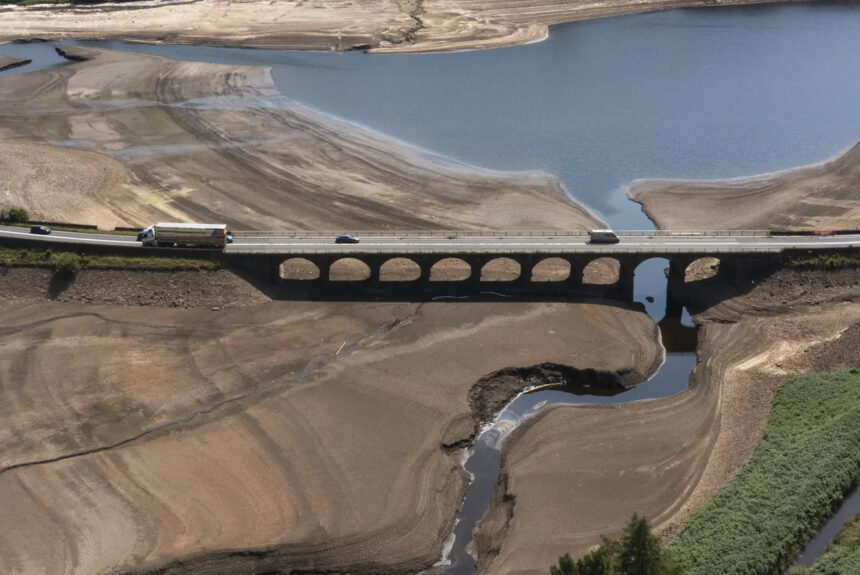The UK faced a bout of drought in the last fortnight, after the driest July in 111 years. With the rain clouds now rolling in, many water companies are still set on enforcing hosepipe bans to conserve water. But these companies have neglected to reduce waste, expand reservoir reserve capacity, and run fiscally responsible business models for the last twenty-five years. While Britain’s fields brown, the leaks in our half-heartedly privatised utilities system become all the more obvious.
>>>READ: Energy Consumption Controls Won’t Solve Scarcity
On the topic of hosepipe bans, Environment Secretary George Eustice wrote in The Telegraph that ‘Saving water is about reducing unnecessary consumption, not restricting essential use.’ Rather than focusing on water consumption bans, Eustice states that ‘The onus must be on water companies to do more to reduce leakage, building on progress made in recent years.’ But, unfortunately for consumers, the progress Eustice praises is apocryphal.
In 1989, Margaret Thatcher’s government auctioned off ten regional water authorities to international buyers for £7.6bn ($9.1bn). At the time, the UK internalised the £4.9bn ($5.8bn) in debts accumulated by the utility companies to the taxpayer. They simultaneously subsidised the new owners with £1.5bn ($1.8bn) of taxpayer cash. No new reservoirs have been built since
Without competitors in the sector, consumers are forced to put up with subpar business practices to access the essential utility. The socialist strategy of blaming privitisation and profit in principle for the failures of the sector is inaccurate. In insulating the companies from cost, and propping them up with additional funds taken from their customers, the government created a natural monopoly that disincentivized innovation to deliver better services for consumers. This explains why leakage levels have stagnated at around three billion liters lost every day since 1996. That comprises more than a fifth of the fourteen billion litre daily national demand. Some suppliers — Northumbrian Water, South West Water, Southern Water and Affinity Water — have missed leakage reduction targets in recent years, according to a National Audit Office (NAO) report.
This unaccountability is evident in how three companies — Anglian Water Group, Severn Trent Water and Yorkshire Water Services — have paid out more in dividends than their total pre-tax profits over the past decade. In a sector where alternative providers were available to switch to, this economic unsustainability would drive inefficient suppliers to extinction.
The lack of accountability combined with the attraction of foriegn investment into our critical infrastructure has left Britain vulnerable to its overseas enemies. Seeking a ‘golden decade’ of Sino-British relations, former Chancellor George Osborne courted Chinese investment in HS2, nuclear power, and water companies. In 2004, Thames Water withdrew from its investment in building China’s first privately funded water plant, due to the CCP’s hostile legal and investment environment at the time. In 2012, the state-owned China Investment Corporation bought into the revenue stream at the source by purchasing a ten percent stake in Thames Water for £500m ($601m).
Since then, Thames Water has shut its £250 million desalination plant —the only of its kind in the UK — despite it providing 400,000 people with 100 million litres of drinking water during droughts. Industry experts have stated this is due to it costing £45 ($54) to produce one million litres of water at a treatment plant, versus £660 ($794) per one million litres at the desalination plant. On the surface, this seems like a fiscally responsible decision. However, the lack of innovation in the affordability of the practice inside the decade speaks both to the lack of cost-competitiveness in the sector, and the potential drag on investment and interest caused by having an adversary part-owning our vital utilities.
>>>READ: Britain Needs New Nuclear to End Reliance on China
Nick Timothy, a key advisor in Downing Street, once warned former Prime Minister Theresa May that China ‘could use their role to build weaknesses into computer systems which will allow them to shut down Britain’s energy production at will.’ Why does our concern about China’s ownership of our nuclear power capacity not extend to their influence over our water supply?
With millions more people needing access to this vital resource, it is wrong that water companies have had no incentive to upgrade Victorian infrastructure for the last thirty years. We must ensure our water supplies are fortified, and protected from throttling by foreign enemies, to meet the essential needs of British consumers during the droughts only likely to increase due to climate change. Rather than tell customers to take colder, shorter showers, and other water consumption bans, Thames Water and their sister companies should innovate to reduce waste, retain water, and lower costs.
Connor Tomlinson is the Head of Research for the British Conservation Alliance. He appears regularly in American Spectator and on talkRadio. Follow him on Twitter: @Con_Tomlinson
The views and opinions expressed are those of the author’s and do not necessarily reflect the official policy or position of C3.
